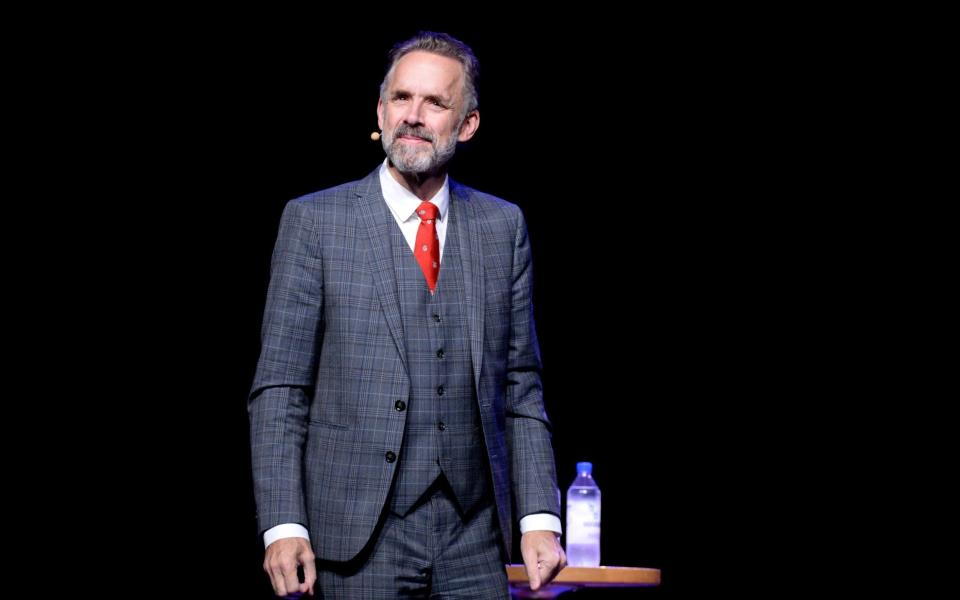Beyond Order: 12 More Rules for Life, review: Jordan Peterson is back with a self-help book that is not here to hug you better

- Oops!Something went wrong.Please try again later.
This book does not arrive like other books. This book is very self-important and hard to get a glimpse of, a sign of Jordan Peterson’s global celebrity and the psychodrama that surrounds him. Either he is the world’s “greatest public intellectual”( … er, really?) or he is that strange, driven Canadian shrink who found fame in his fifties by writing a book that reached those who don’t normally read self-help books: men.
Not since I had to go and sit in an office to leaf through Madonna’s Sex book and promise not to reveal anything about it (guess what it was about!) have I felt so much nervousness around a book.
The success of his earlier book, 12 Rules for Life: An Antidote to Chaos, was phenomenal, selling millions globally. Overnight this stern-looking clinical psychologist became a guru for men who felt dispossessed by modernity, and feminism in particular. His lectures were packed out. His YouTube channel a huge success.
His advice – stand up straight (this is how lobsters establish dominance, apparently), tidy your room, treat yourself like you are someone you are responsible for helping – was obvious and underpinned by stories from his clinical practice and his reading of the Bible, Jung, Russian literature and mythology.
In an age of moral relativism he was giving his readers a compass. He spoke about the poor self-esteem of young men and took against the “aggrieved victimhood” of campus culture. He reminded me a lot of Camille Paglia, whom I interviewed in the 1990s. Punchy and utterly at odds with kids raised in soft play areas.
For this he became a figurehead for the alt-Right when he is not that at all. Rather he is an old-fashioned liberal with a conservative attitude to the family, a man who doesn’t believe in “patriarchy” but acts precisely as a paternal authority to all the lost boys.
Watching him, it is apparent he cannot obey his own rules, but in telling us that life is suffering (as all major religions do) and that the goal is to find meaning rather than happiness, he does have something to say. Within him, one feels chaos is near the surface. He often cries and is crumpled with emotion.

As he discusses in the overture and coda of the book, the circumstances in which he wrote it were exceptional. He has been broken by the past few years, as his beloved wife Tammy was diagnosed with a terminal illness (she has since recovered). To cope with his depression he was prescribed Valium and the dose kept being increased. Benzodiazepine addiction is not something any shrink does not know about but he writes that he “developed a substance dependency I had unwittingly stumbled into”.
This resulted in various rehabs in Russia and Serbia, being put in an induced coma, catching Covid and being given ketamine (!) at points. The dragons this man had to slay!
So, with the new rules he gives us a rebirth, a miracle really. They are more biblical than ever. It is again hokey wisdom combined with good advice. Peterson is at his best when telling stories of his clinical practice – he comes across as an empathetic non-judgmental listener. In More Rules he tells about delving into the past of a young gay black man who convulses in his sleep, and that of a woman frozen in her emotional life.
His interpretations of Harry Potter, the Bible and Nietzche reveal the gaps in his knowledge. Has he never read Levi-Strauss, who found the commonalities in myth? Does his hatred of “-isms” make him ignore any thinker who references Marx? Politics are his weakest point.
He says that individuals must deal with our shadow selves and confront what we fear. Like all Jungians he is inherently conservative. The world is divided into masculine (order) and feminine (chaos) and this is the eternal struggle, one he now seems to actually embody.

His followers on the alt-Right may see him as a warrior against a coddled generation but he is way more nuanced than that. He sees what liberalism offers, how art transforms the unknown but defends tradition.
His first rule here is, do not carelessly denigrate social institutions or creative achievement. But there is no real analysis of how power operates, how society works.
There is also not much here for women at all. He advises having babies young and keeping your marriage alive with candles, lingerie and talking. Plan and work diligently to maintain the romance in your relationship is one of his instructions.
Yet the rules are really nothing to argue about: aim single-mindedly for what you want; make one room in your house beautiful; do not become resentful, deceitful or arrogant; be grateful in spite of your suffering.
This search for meaning, for responsibility instead of freedom and happiness, are basic existential messages. And indeed courageous. His quest for certainty has been compromised by his personal life. He has stared into the abyss of chaos, the feminine dark matter from which we all derive.
One of his rules is “abandon ideology” but at times in discussion he can be the ultimate ideologue. He is tetchy, thin-skinned, odd beyond belief, charismatic because of his emotional vulnerability and, dare I say it, feminised. We are drawn to his weakness as well as his strength.
Life is not easy and Peterson is not here to hug you better. He is here to tell you to take responsibility for yourself to avoid disintegration.
“People are fragile,” says the preacher man. And God knows, he knows. And that is why he compels us so.
To order your copy for £19.99 call 0844 871 1514 or visit Telegraph Books
